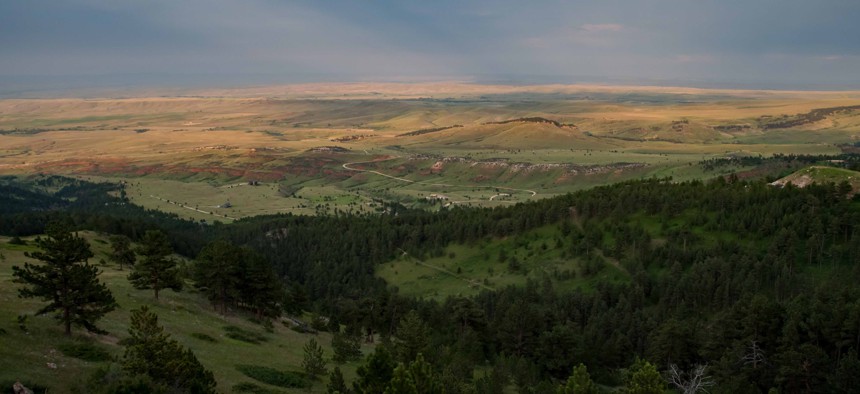It’s Time for Congress to Step Up Its Support for Public Lands Counties

Montana and Wyoming landscapes are seen from scenic overlooks near Dayton, Wyoming along U.S. Highway 14 in the Bighorn National Forest on July 9, 2018. Patrick Gorski/NurPhoto via Getty Images
COMMENTARY | Local governments with huge swaths of federal land make important contributions to the nation’s economy, but also face unique challenges. Lawmakers should act to shore up the programs they depend on.
The federal government owns close to 30% of the nation’s landmass with the vast majority located west of the Mississippi River. Federal public lands are everywhere from large, urban areas, like Los Angeles County to small, rural communities, like Prairie County, Montana, where I serve as a county commissioner. My county is 43% federally owned and managed, but many others are over 90% federally owned.
While public lands counties like mine vary in size, population and geography, our prosperity is dependent upon solid working relationships with federal lands agency personnel who understand our communities’ needs and what it means to be a good neighbor. When we prosper, America thrives.
Outdoor recreation on public lands, including hunting and fishing, contributes hundreds of billions of dollars to local economies and supports millions of local jobs. Resource development on federal lands, including timber harvests, oil and gas drilling, or mining the minerals to build wind turbines and solar panels, is also an important economic driver in many western communities and directly impacts the price of goods and services.
Ranchers who graze livestock on public lands play a critical role in our nation’s reliable food supply. Protecting and expanding access to federal lands will contribute to a more dependable domestic supply chain and reduce our reliance on food, fiber and fuel developed by volatile nations like Russia and Venezuela.
Virtually all uses of federal land, whether recreational, agricultural or energy development, inject new wealth and opportunity into the U.S. economy. This activity also generates significant revenues for federal, state, and local governments. Newly employed individuals and small businesses spend and invest in the community, generating further tax revenues to meet important public needs.
The responsible use and development of our natural resources benefits everyone. However, even under the best circumstances and strong intergovernmental partnerships, opportunities for economic growth and diversification in public lands counties can be severely restricted. The federal government has imposed legal and regulatory restrictions on the use and development of resources. Furthermore, counties cannot tax federally owned property, limiting the resources we are able to invest in critical infrastructure, education, emergency response services and crime prevention.
Congress partially compensates public lands counties for this lack of tax revenue from the presence of federal lands within our jurisdictions through the Payments In Lieu of Taxes or PILT program, which was funded at $549 million this year. Counties use these funds to provide essential services on and around federal lands to residents and visitors alike.
While counties appreciate and support the PILT program, it is nearly impossible for many local governments to plan budgets when such a large percentage is so dependent upon the annual congressional appropriations process.
Congress should show its commitment to public lands counties by making PILT a mandatory long-term program and ensure a full funding formula with little to no deductions that also fairly and equitably compensates smaller, more rural counties.
Another federal program crucial to national forest counties is Secure Rural Schools or SRS, which this year provided $250 million in targeted funding to counties to support schools, roads, community wildfire protection, and watershed and landscape health projects within national forests. It was established in 2000 to make up for lost revenues to counties from decreased timber harvests within national forests due to changes in federal policy.
SRS was reauthorized through FY 2023 under the Bipartisan Infrastructure Law, but after the final round of authorized payments are issued, national forest counties could see revenues decline by 80%.
Counties appreciate the SRS reauthorization and call on Congress to work with state and local governments to support rural prosperity through a robust timber and forest products industry moving forward.
The prosperity of America is directly tied to our public lands and surrounding communities. The federal government can show its commitment to a more prosperous public lands economy by working closely with county governments to meet the needs of residents, visitors and the overall economy, while also fully funding critical programs like PILT and SRS into the future.
Todd Devlin is a Prairie County, Montana commissioner and chairman of the National Association of Counties Public Lands Policy Steering Committee.
NEXT STORY: The Housing Market is Cooling Off





